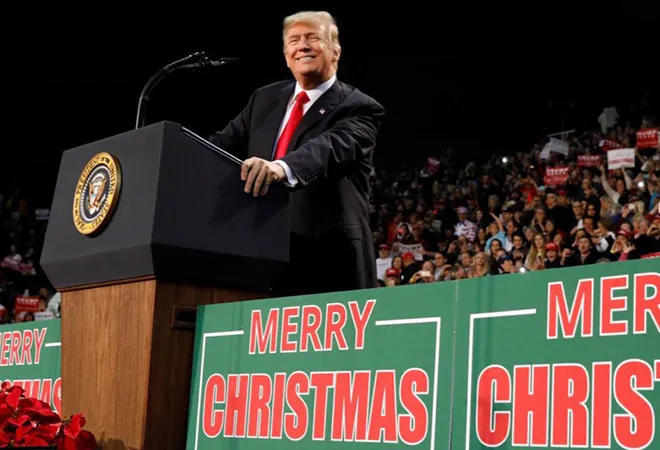The new National Security Strategy (NSS) document unveiled by US President Donald Trump earlier this week showcases a world locked in unceasing economic competition. In this world, Washington is not preoccupied with promoting democracy abroad and will focus instead on great power competition, economic rivalry and homeland security. History, as they say, finally and formally ended for the liberal fallacies which had come to dominate the US foreign policy discourse and practice since the end of the Cold War.
The Trump administration has defined the new strategy as one based on “principled realism” in an “ever-competitive world”. Focusing frontally on great power politics, the new document calls Russia and China “revisionist powers” seeking to change the global status quo, and paints a stark picture of the world, rejecting cooperation in favour of competition. The US president made it clear that “China and Russia challenge American power, influence and interests, attempting to erode American security and prosperity”. The US, therefore, has to “rethink the policies of the past two decades—policies based on the assumption that engagement with rivals and their inclusion in international institutions and global commerce would turn them into benign actors and trustworthy partners”, the document says. “For the most part, this premise turned out to be false.”
It is an extraordinarily blunt attack on the two powers as Trump underlined that Russia and China “are determined to make economies less free and less fair, to grow their militaries, and to control information and data to repress their societies and expand their influence”. The US president also claimed China and Russia are developing “advanced weapons and capabilities” which could threaten the US’ “critical infrastructure and our command and control architecture”. The US is openly acknowledging that “vigorous military, economic and political contests are now playing out all around the world” and the Trump administration intends to “raise our competitive game to meet that challenge, to protect American interests, and to advance our values”. In Trump’s own words: “We will stand up ... like we have never stood up before.”
The idea of democracy promotion, traditionally a cornerstone of US foreign policy, is now being given a go-by. As per Trump’s ‘America First’ approach, the US is more likely to “demand fair and reciprocal economic relationships around the world”. The economic piece gets much more attention. Tough action against China is expected in the coming week, with suggestions that the Trump administration could apply new punitive tariffs on goods from the country, even as an investigation into China’s intellectual property theft and forced technology transfer policies is nearing completion. There is a new-found emphasis on the importance of US intellectual property and the NSS introduces the idea of a “national security innovation base” comprising everything from academia to tech companies. It declares, “The genius of creative Americans, and the free system that enables them, is critical to American security and prosperity.”
Climate change too has been jettisoned as a national security priority, something which was expected after Trump pulled the US out of the Paris climate accord in June. This despite the fact that Trump has signed off on the 2018 defence spending Bill that states, “Climate change is a direct threat to the national security of the United States.”
Yet, the global multilateral order has not been completely ignored as the “economic system continues to serve our interests”, according to the NSS, though “it must be reformed to help American workers prosper, protect our innovation, and reflect the principles upon which that system was founded”. There is still an expectation that “trading partners and international institutions can do more to address trade imbalances and adhere to and enforce the rules of the order”. The need for greater cooperation with allies and partners in tackling China on the economic front has been articulated. The isolationist sentiment engendered by the campaign rhetoric of Trump has given way to a more nuanced understanding of the reality confronting a major power in the 21st century.
Even in a document that is cast in such stark terms, the treatment of India stands out. Seeking to support “India’s emergence as a leading global power”, the NSS calls for increasing “quadrilateral cooperation with Japan, Australia, and India”. It is tough on Pakistan, calling on it to desist from engaging in “destabilizing behavior” in Afghanistan as well as to end its “support for militants and terrorists” targeting American interests in the region. Once again, the Trump administration is signalling to Pakistan that Rawalpindi is on notice as “no partnership can survive a country’s support for militants and terrorists who target a partner’s own service members and officials”.
In his speech unveiling the new NSS, Trump underlined that “America is in the game and America is going to win”. But it will be some time before the implications of this new strategy are clear. Despite the ambitious rhetoric of the new strategy, there is a stark imbalance between the ends, ways and means in the document. And soon, the new document will have to come to terms with the real world where many of the ideas articulated may be found wanting. The world, therefore, will be watching the Trump administration’s actions more closely than it will read the new NSS.
This commentary originally appeared in Live Mint.
The views expressed above belong to the author(s). ORF research and analyses now available on Telegram! Click here to access our curated content — blogs, longforms and interviews.




 PREV
PREV


